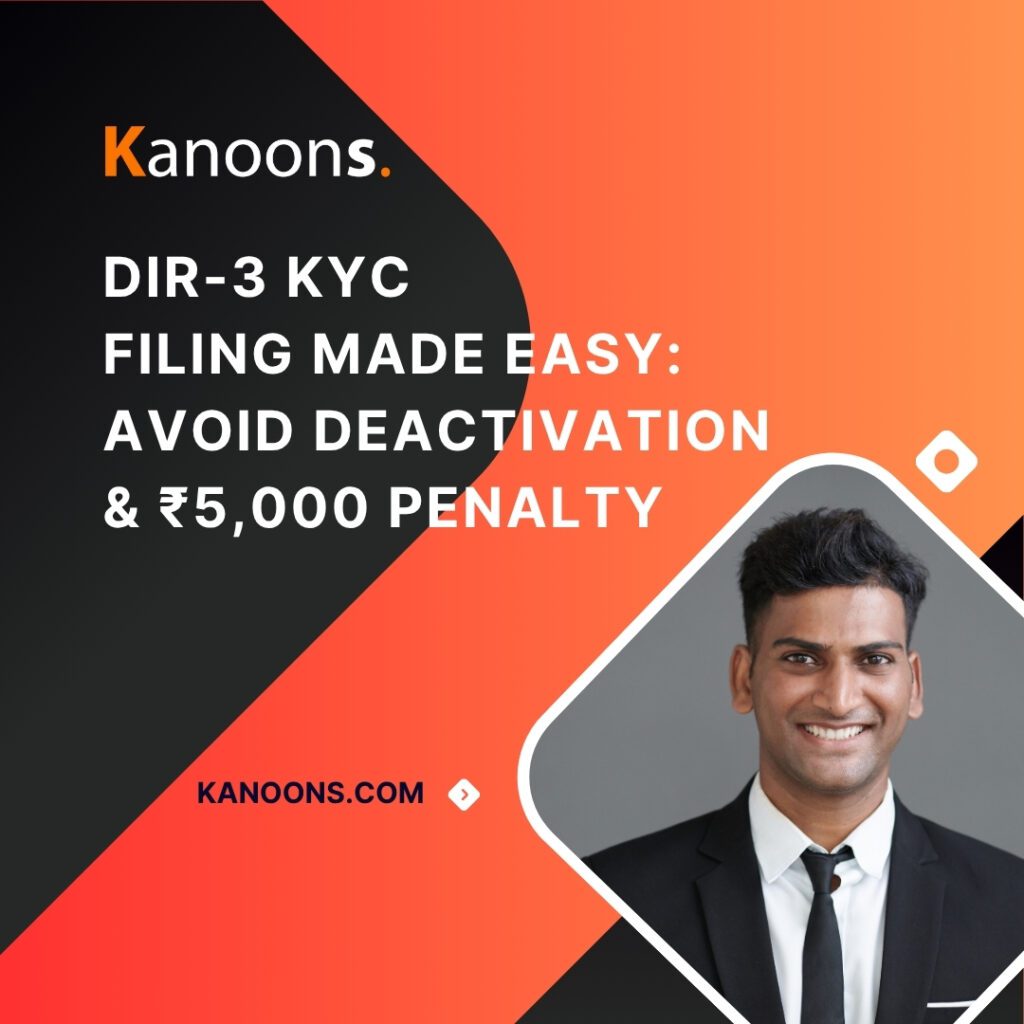
Identity/address proof of trustees
Registered office address proof
Trust deed on stamp paper
Activity reports
Bank statements
Terms & Conditions
1. Engagement & Scope
1.1 Kanoons Law & Tax Consultants Pvt. Ltd (“Service Provider”) provides consultancy services for trust registration under the Indian Trusts Act, 1882.
1.2 Services include:
Trust deed drafting
Stamp duty calculation
Registration application filing
12A/80G certification assistance (if opted)
1.3 Final registration approval rests with the Sub-Registrar/Charity Commissioner.
2. Client Responsibilities
2.1 Client shall provide:
Accurate KYC of all trustees
Notarized copies of trustee resolutions
Proof of registered office address
2.2 Client must:Pay stamp duty directly to government
Attend registration appointment if required
3. Fees & Payments
3.1 Quoted fees exclude:
State-specific stamp duty (varies 1-8% of trust property value)
Registration fees (₹1,000-₹5,000 based on state)
GST (18%)
3.2 Payment schedule:50% advance upon engagement
50% balance before submission to Registrar
3.3 No refunds once document drafting begins.
4. Timeline & Deliverables
4.1 Standard processing: 7-15 working days post-document collection.
4.2 Delays may occur due to:
Sub-Registrar’s workload
Document verification issues
Force majeure events
5. Trust Deed Specifics
5.1 Drafted trust deed includes:
Objectives (religious/charitable/educational)
Trustee powers & responsibilities
Beneficiary clauses
5.2 Amendments post-registration require:Fresh stamp duty payment (if applicable)
Registrar approval
6. Tax Exemption Certification
6.1 12A/80G applications:
Require separate fees
Processing time: 3-6 months
6.2 Approval subject to IT Department discretion.
7. Intellectual Property
7.1 Trust deed templates remain Kanoons’ proprietary material.
7.2 Client granted single-use license for registration purposes only.
8. Liability
8.1 Service Provider not liable for:
Registration rejections due to client-provided information
Tax exemption denials
Trustee disputes
8.2 Maximum liability capped at service fees paid.
9. Data Protection
9.1 Trustee data handled per:
Indian IT Act, 2000
Client confidentiality agreement
9.2 Documents shared only with registration authorities.
10. Termination
10.1 Either party may terminate with 15 days written notice.
10.2 Post-termination:
Client pays for completed work
Draft documents must be returned
11. Governing Law & Dispute Resolution
11.1 Agreement governed by Indian laws with jurisdiction in Hyderabad, Telangana.
11.2 Disputes resolved through:
Mediation (Hyderabad Mediation Centre)
Arbitration (Hyderabad International Arbitration Centre)
12. General Provisions
12.1 Entire agreement supersedes all prior discussions.
12.2 Amendments require written consent.
12.3 Force majeure clauses apply for delays beyond control.
Trust Registration
Legal establishment of charitable trusts for religious, educational, or social welfare purposes under the Indian Trusts Act, 1882.
A Trust Registration creates a legal entity to manage assets for charitable, religious, or social objectives. Registered trusts enjoy tax benefits and can receive donations under Sections 12A/80G of the Income Tax Act.
At Kanoons, we handle the complete trust registration process, from document preparation to final certification by the Sub-Registrar/Charity Commissioner.
Why Choose Trust? (Advantages & Disadvantages)
Advantages:
- Tax exemptions under Sections 12A/80G
- Eligible for government grants
- Separate legal identity
- Perpetual succession
Disadvantages:
- High stamp duty in some states
- Complex compliance requirements
- Irrevocable once registered
Who Should Register a Trust?
- NGOs pursuing social causes
- Religious organizations managing temples/mosques
- Educational institutions (schools/colleges)
- Healthcare providers running charitable hospitals
- Family trusts for asset management
- Startups seeking CSR funding.
Documents Required for Trust Registration
For All Trusts:
- Identity/address proof of trustees
- Registered office address proof
- Trust deed on stamp paper
Additional for 12A/80G:
- Activity reports
- Bank statements
Trust Registration Process (Step-by-Step)
- Objective Finalization (Drafting trust deed)
- Document Preparation
- Stamp Duty Payment (State-specific)
- Registration with Sub-Registrar
- PAN/TAN Application
- 12A/80G Certification (Optional)
Kanoons ensures a hassle-free, 100% online Trust registration process!
What’s Included in Our Trust Registration Package?
- Trust deed drafting
- Stamp duty guidance
- Registration application
- PAN/TAN processing
- 12A/80G application (optional)
Post-Registration Compliances for Trust
✔ File annual IT returns (even if income is nil)
✔
Maintain proper books of accounts
✔
Renew 80G certification every 3 years
✔
Conduct annual general meetings
Why Kanoons?
🌟 Trust deed drafting by legal experts
🌟
State-specific guidance (Stamp duty calculation)
🌟
Liaison with Registrar offices
🌟
Tax exemption certification support
🌟
Compliance management
Failure to meet Trust Registraiton obligations can result in severe consequences:
- ₹10,000 fine for late filings
- Cancellation of 12A/80G benefits
- Legal action for fund misutilization
- Trustee disqualification in severe cases
Indian Subsidiary Company
₹29,499.00 – ₹79,499.00Price range: ₹29,499.00 through ₹79,499.00
RERA Registration
₹7,499.00 – ₹24,499.00Price range: ₹7,499.00 through ₹24,499.00
Trust Registration
₹9,999.00 – ₹29,999.00Price range: ₹9,999.00 through ₹29,999.00
Professional Tax
₹2,499.00 – ₹7,499.00Price range: ₹2,499.00 through ₹7,499.00
ESI Registration
₹9,999.00 – ₹14,499.00Price range: ₹9,999.00 through ₹14,499.00
Valuable insights to change your startup idea
FAQ
Trust Frequently Asked Question
Minimum trustees required?
Can a trust own property?
Difference between trust and society?
Time required for registration?
Is audit mandatory?
Can objectives be changed later?
Get Started Today!
Register Your Trust Now & Get Legal Compliance Support!
Limited-Time Offer
Get Your Trust Registered at ₹9,999!
Take the first step towards building a legally recognized and protected business. With Kanoons, experience a hassle-free, fully online Trust Registration backed by expert legal and compliance support.
© 2025 Copyright. All Rights Reserved by Kanoons
Kanoons.com is owned and operated by Kanoons Law and Tax Consultants Private Limited, a registered consultancy providing services in the areas of advisory, documentation, business registration, taxation, compliance management, and intellectual property filings across India.
Kanoons is not a law firm or accounting firm, and does not offer legal representation, statutory audits, attestation, or certification services. All specialised professional work is coordinated through authorised and independently qualified professionals, in accordance with applicable Indian laws.
All content on this website is intended for general informational purposes only and should not be interpreted as legal, financial, or tax advice. Use of this website or communication through it does not create any attorney–client, accountant–client, or other professional relationship with the company. Users are encouraged to seek independent professional advice before making any decisions based on content or services provided herein.
Your access to and use of this website are subject to our Terms & Conditions, Privacy Policy, Refund and Returns Policy and Disclaimer By continuing to browse or interact with the site, you acknowledge and agree to these terms.
We are committed to safeguarding user information and follow applicable data protection laws, including the Information Technology Act, 2000, and rules thereunder.
The wordmark “Kanoons®”, its logo, and all related brand assets are the exclusive intellectual property of Kanoons Law and Tax Consultants Private Limited. Any unauthorised use, imitation, or reproduction is strictly prohibited and may lead to civil or criminal action.
For queries, service coordination, or support, please contact:
support[at]kanoons[dot]com | +91 90000 13560 / 90













"Kanoons registered our educational trust and secured 80G approval in 3 weeks!"
Dr. Anil Mumbai